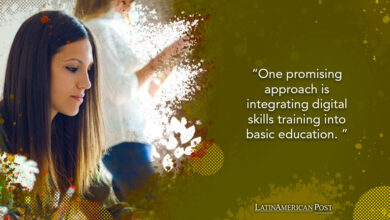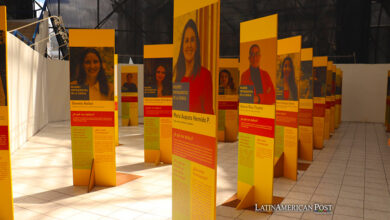The Effective Ways to Combat Gender Violence
Hitting, screaming, humiliation, disqualifying words, forced confinement, isolation, and permanent threats make up the life scenario to which many Latina women are exposed daily and which could be summarized in three words: Gender Violence.

The Woman Post | María Consuelo Caicedo Toro
Listen to this article
What to do in the face of gender violence? Where to go? Who to trust? How to break free? Why does a woman endure abuse? What reason prevents her from reporting and leaving the environment that victimizes her day by day? What are the living conditions that characterize the scenarios of gender violence?
In order to find answers and to have elements of analysis of this problem to which no Latin American country escapes, The Woman Post consulted two Colombian specialists. Ana María Romero, a biologist at the University of Los Andes, who, since 2018, began to be interested in feminist issues that include economics, social justice and communication, a path that, of course, has led her to delve into topics such as violence of genre.
Violence and pandemic
What happens in Latin America during this time of forced confinement due to Covid-19? For Romero, the first thing we must refute is the concept so socially ingrained that men are stronger beings and women are submissive people: “If we see ourselves like this, we justify aggressive male behavior and the lack of reaction of women in their defending."
In Latin America, economies are so depressed that women, in addition to their paid work, must ensure the well-being of household members through domestic tasks, which doubles their efforts and the worst thing is that “in these times of pandemic live 24 hours with their aggressors.”
Thus, violence at home seems to be naturalized “because, in the eyes of the majority (including women), it is normal for a man to demand that his partner have sexual relations even if she does not want to, it is the duty that she has clean clothes and house, cook and wash dishes, take care of children and/or the elderly and, incidentally, bring money home. It would seem “normal” then for men to shout or beat up women to fulfill those obligations that, traditionally, culturally, socially and supposedly, are attributed to them.
Also read: COVID-19 INCREASES DOMESTIC VIOLENCE IN VENEZUELA
Aggravates the problem, according to Romero, that the official entities to which a violent woman can go for help “are not managed by people who are academically trained in gender issues and, very often, have a macho look at reality. Justice in Latin America is sexist and misogynistic.”
What to do then? Romero's response indicates that “women must unite, form support networks, put aside another cultural tradition that marks us as rivals from each other. Latinas must organize, educate ourselves and face the problem of gender violence together. We are not going to achieve it in isolation ”.
In a pandemic, we take off our masks
Milena Montealegre did her master's degree in gender equality and prevention of gender violence. Like Ana María Romero, she believes that in times of pandemic gender violence has been enhanced by the effects of permanent coexistence that “forces us to share spaces and, in the case of women, to work twice as much because they must fulfill roles punctual at home and, virtually, with the companies that hire them.”
The boundaries have been blurred. The pandemic has generated in all of us stress, anguish, boredom, despair "and it has taken away the masks that we had been wearing." If the woman does not work, the matter worsens “because the man feels empowered and grows in the face of the fears and insecurities of his partner who dedicated herself to housework. Many women have lost their jobs in these times and that makes them dependent.”
Milena was also a victim
It is difficult for a woman to value herself when her self-esteem is on the floor "but if this pandemic has taught us something, it is that we cannot depend on a single job, that is, we must have our eggs in several baskets." Entrepreneurship opens up the possibilities for this to be the case because it promotes the generation of income independent of that provided by formal work.
What does it mean to visualize this light on the road? Milena Montealegre's advice for each woman who reads to us is to "find her potential and strengths in art, cooking, crafts, business or other fields and generate additional income from vehicle work." On the other hand, it is important "to understand that life is short and that staying with a person because they pay for electricity, water and food, is not worth it." Milena knows what she is talking about, she was a victim of domestic violence.
Laws don't help? “Let's remember that, traditionally, they have been made by men and for men. That is why women must know about politics, laws, rights, prepare ourselves, hold public positions, lead.” That does not mean that we should be separated from men, on the contrary, it is pertinent that we team up because the different way we have of seeing things, life complements us.
Milena concludes: “Many women don't know each other, they don't know what they want and that is why they assume what interests their partners. They have told us that we cannot, that we are not capable and we believe it. We do not know what our north is and we do not seek it. We must initiate a cultural revolution that arises from each female heart identifying dreams, tastes, desires of our own and uniting with other similar women. Today it is important to specialize in one thing and to be good at it, to master a subject and enjoy it, that gives satisfaction and empowers.”
And if the woman who has been the object of gender violence is reading to us and needs to heal, Milena Montealegre recommends to her, “Forgive yourself and forgive the aggressor, recognize his deficiencies. The second thing is to love herself because when a woman loves herself, recognizes her right to deserve, sets limits, she can design her life project, stop, rest, continue when she decides to do so and have compassion for herself, she does not admit to judging herself or self-whipping. Finally, women must value today and now, not allow the future to generate anguish and anxiety or the past to cause nostalgia and suffering.” Living today allows us to hear the birds and feel the sun's rays on our skin, when we choose to do so.




